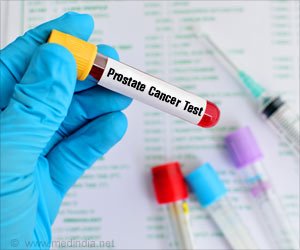Radiation-hormone Therapy Slows Growth of Prostate Cancer

EXTEND is a basket trial involving adults with five or fewer metastases from different types of solid tumors. The study from Dr. Tang’s team is the primary analysis of the prostate basket, which enrolled 87 participants who were on intermittent hormone therapy for prostate cancer. These patients were randomized to receive hormone therapy either with (n=43) or without (n=44) local therapy. Options for local therapy included radiation, surgery or cryotherapy to all sites of oligometastatic disease; all men on the trial received radiation therapy.
Patients received hormone therapy for at least two months before starting the trial, and each participant stopped hormone therapy for a planned break six months after they started the trial. Patients restarted hormone therapy at the time their disease progressed.
Advertisement
Researchers tracked the amount of time until patients showed evidence that their cancer had progressed, such as rising PSA. They also measured the amount of time that patients maintained normal testosterone levels after treatment before needing to restart hormone therapy.
The median follow-up was 22.1 months, and during that time, 41 patients’ cancers progressed. Those who received local therapy as well as hormone therapy experienced longer progression-free survival (median not reached vs. 15.8 months for hormone therapy-only; HR 0.25, 95% confidence interval 0.12-0.55, p
Fewer patients in the combination arm had new lesions two years after treatment (33% vs. 41%, p=0.004). Patients in the combination arm also experienced normal testosterone levels longer than those who did not receive local therapy (p=0.03). Three severe (i.e., grade 3) side effects were observed in each treatment group.
“Hormone therapy has been shown in multiple studies to synergize with radiation therapy to reduce prostate cancer cells’ ability to repair themselves from radiation-induced DNA damage,” he explained.
In addition to clinical outcomes, the research team also examined the immune stimulating effects of radiation. “In our study, we saw increased T-cell activation and other signals of greater immune activity in patients on the combined therapy arm but not in the hormone therapy-only arm.”
After a patient’s prostate cancer metastasizes, they typically receive continuous hormone deprivation. Dr. Tang said this study introduces a new paradigm of definitive radiation therapy to all of a patients’ oligometastases in tandem with de-escalated, intermittent hormone therapy as a means to preserve quality of life while still maintaining disease control.
Source: Eurekalert
Source link
#Radiationhormone #Therapy #Slows #Growth #Prostate #Cancer



